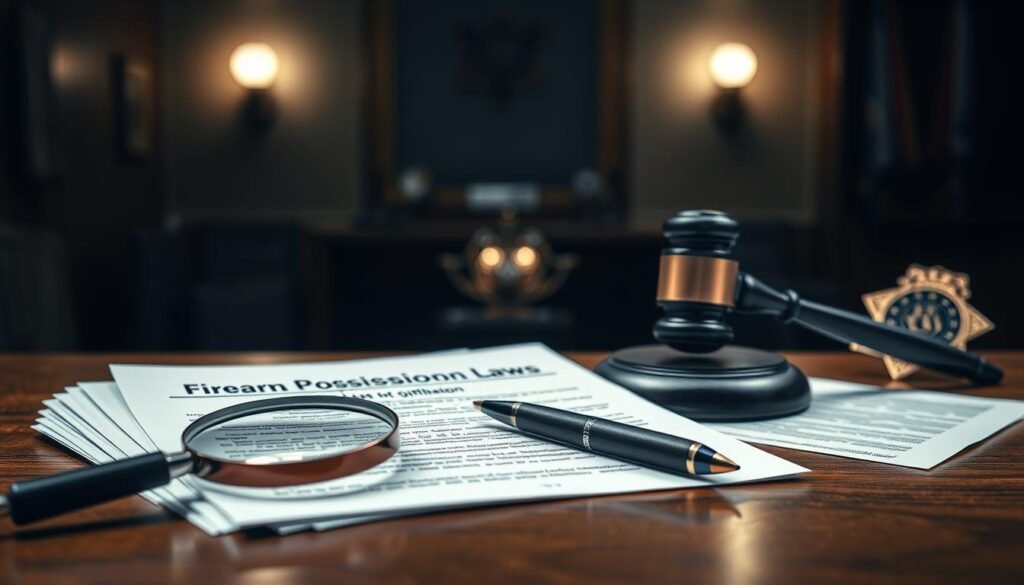Last updated on December 5th, 2025 at 07:14 am
Can Felons Own Guns in Alaska? If you’re curious about felon gun rights in Alaska, you’re not the only one. Alaska’s laws on guns can be tricky, especially for those with felony convictions.
Alaska’s gun laws are different from federal and other state laws. It’s important for felons to understand Alaska state laws about owning guns.
Knowing how these laws affect you is key. This article will help you understand federal and state laws on felon gun rights in Alaska.
Contents
- 1 Federal Gun Laws for Convicted Felons
- 2 Can a Felon Own a Gun in Alaska? State Laws Explained
- 3 Restoration of Gun Rights for Felons in Alaska
- 4 Consequences of Illegal Firearm Possession by Felons
- 5 Alaska vs. Other States: Felon Gun Rights Comparison
- 6 Conclusion
- 7 FAQ: Can Felons Own Guns in Alaska?
- 7.1 Can a felon in Alaska own a gun if their conviction is expunged?
- 7.2 What are the penalties for a felon caught with a gun in Alaska?
- 7.3 How do Alaska’s gun laws compare to federal laws regarding felon gun ownership?
- 7.4 Can a felon hunt with a firearm in Alaska if they are accompanied by someone else?
- 7.5 Are there any exceptions for felons to own antique firearms in Alaska?
- 7.6 How can a felon in Alaska restore their gun rights?
- 7.7 Can a felon in Alaska possess a muzzleloader or black powder firearm?
- 7.8 What should a felon do if they’re unsure about their gun rights in Alaska?
Federal Gun Laws for Convicted Felons
Federal laws make it hard for felons to own guns. It’s against the law for someone with a felony to have a firearm. This rule is for both violent and non-violent crimes.
The Gun Control Act (GCA) sets these rules. The Bureau of Alcohol, Tobacco, Firearms and Explosives (ATF) makes sure these laws are followed. Felons caught with a gun face serious penalties. They could get more felony charges and a long prison sentence.
Implications of Federal Laws on Felons
Federal laws have big effects on felons. Even if a state lets a felon own a gun, federal law might not. This means felons could still be banned from owning guns.
| Law | Description | Implication for Felons |
|---|---|---|
| Gun Control Act (GCA) | Regulates firearm possession | Prohibits felons from possessing firearms |
| Federal Law | Overrides state law in firearm possession | Felons may still be prohibited even if state rights are restored |
It’s key for felons to know these laws to stay out of trouble. They should also get legal advice. This helps them understand both state and federal gun laws. [Can Felons Own Guns in Alaska?]
Can a Felon Own a Gun in Alaska? State Laws Explained
If you’re a felon in Alaska, knowing your rights about guns is key. Alaska’s gun laws for felons are different from federal ones. It’s important to understand these laws to handle gun ownership well.
Alaska’s laws on felon gun ownership are mainly in the state’s statutes. These laws explain when a felon can or can’t have a gun. Unlike federal laws, Alaska’s laws are more detailed.
There are specific exceptions in Alaska for felons to own guns. For example, if a felon was convicted of a non-violent crime, they might be able to own a gun under certain rules. [Can Felons Own Guns in Alaska?]
- A felon’s gun rights might be restored if their conviction is set aside or expunged.
- Some felonies are considered non-violent under Alaska law, potentially allowing for gun ownership.
- Alaska’s statutes provide for the possibility of restoring gun rights through a court process.
It’s crucial to look at Alaska’s state laws and maybe get legal advice. Laws can change, and your situation can affect your gun ownership rights.
By knowing Alaska’s laws and the exceptions for felon gun rights, you can better understand your legal situation. This might help you regain your right to own a firearm.
Restoration of Gun Rights for Felons in Alaska
Alaska’s laws offer a way for felons to get their gun rights back. But, you must follow certain rules and steps. If you’re a felon wanting to own guns again, knowing these rules is key. [Can Felons Own Guns in Alaska?]
You need to meet Alaska’s rules to be eligible. This means you must have finished your sentence and waited a certain time. The type of felony you had also matters, as some can’t be undone.
Eligibility Criteria and Application Process
To qualify, you must have finished your sentence and have no pending charges. You also need to file a petition with the court. This petition should include details about your conviction and why you want gun rights back.
The court will look at your criminal history and how you’ve acted since your conviction. Showing you’ve changed and are committed to following the law is important. This helps make a strong case for getting your gun rights back.
After you file your petition, the court will hold a hearing. You might need to talk about your application and give more information. The court will decide based on what you present.
If the court says yes, you’ll get a notice. This means you can legally own guns in Alaska again. It’s a big step towards getting your rights back. [Can Felons Own Guns in Alaska?]
Getting your gun rights back is a detailed process. But, with the right preparation and understanding of the rules, you can do it. It’s a legal journey worth taking.
Consequences of Illegal Firearm Possession by Felons
If you’re a convicted felon in Alaska, having a gun illegally can cause big problems. It’s important to know what can happen to make smart choices.
In Alaska, getting caught with a gun illegally can mean serious felony charges. This can lead to a lot of time in prison and big fines. The state’s laws are strict to stop people from having guns illegally.

There are more issues to think about too. For example, a conviction for illegal gun possession can mess up your future legal status. It might affect your parole or probation.
Also, having a felony conviction can hurt your job chances. Many employers check your background, and a felony can make it hard to find work.
| Consequence | Description | Impact |
|---|---|---|
| Legal Penalties | Felony charges, prison time, fines | Immediate and severe |
| Future Legal Status | Affects parole or probation terms | Long-term legal complications |
| Employment Opportunities | Difficulty securing a job due to background checks | Long-term financial impact |
It’s essential to follow Alaska’s gun laws to avoid these serious problems. If you’re a felon, knowing your rights and the laws about guns is key. [Can Felons Own Guns in Alaska?]
Alaska vs. Other States: Felon Gun Rights Comparison
Alaska’s laws on felon gun rights are different from many other states. This creates a varied landscape across the U.S. Alaska allows felons to own guns under certain conditions, while other states have stricter laws.
In states like California and New York, felons can’t own guns, with only a few exceptions. Alaska and some other states, like Arizona, have more lenient laws. They allow felons to possess guns unless a court order says otherwise. [Can Felons Own Guns in Alaska?]
Implications for Felons in Different States
The differences in state laws are very important for felons who move from one state to another. For example, a felon who legally owns a gun in Alaska might break federal or state laws if they move to California. This is because they might not know the local regulations.
| State | Felon Gun Rights | Key Restrictions |
|---|---|---|
| Alaska | Allowed unless court-ordered | Specific court orders prohibiting gun ownership |
| California | Generally prohibited | Felony conviction results in gun ownership ban |
| Arizona | Allowed unless court-ordered | Similar to Alaska, with specific court-ordered restrictions |
It’s very important for felons to understand these differences. This helps them avoid breaking gun laws when moving between states. It’s also key for lawmakers to find the right balance between public safety and individual rights.
See Also: Muzzleloader Ownership for Felons in Tennessee
Conclusion
You now know a lot about the laws on felon gun rights in Alaska. Federal laws say felons can’t have guns. But Alaska has some rules that let felons own certain guns under certain conditions.
In Alaska, felons can get their gun rights back through a court order. But, having a gun illegally can lead to serious trouble. This includes felony charges and jail time.
Alaska’s laws are more lenient than some other states. They let felons own certain guns in specific situations. It’s very important to understand both federal and state laws well.
So, whether a felon can own a gun in Alaska is not simple. It depends on the type of felony and the person’s situation. [Can Felons Own Guns in Alaska?]
FAQ: Can Felons Own Guns in Alaska?
Can a felon in Alaska own a gun if their conviction is expunged?
Even with an expunged conviction, federal law still bars felons from owning guns. This is unless their rights are restored through a pardon or other legal means.
What are the penalties for a felon caught with a gun in Alaska?
In Alaska, having a gun as a felon is a class C felony. It can lead to up to 5 years in prison and a fine of up to ,000. [Can Felons Own Guns in Alaska?]
How do Alaska’s gun laws compare to federal laws regarding felon gun ownership?
Alaska’s laws are a bit more lenient than federal ones in some areas. Yet, both state and federal laws generally bar felons from owning guns.
Can a felon hunt with a firearm in Alaska if they are accompanied by someone else?
No, Alaska law bans felons from having guns, even with someone else around. This is unless their rights have been fully restored.
Are there any exceptions for felons to own antique firearms in Alaska?
Federal law has an exception for antique firearms. But Alaska state law doesn’t, so owning an antique firearm is still a crime for felons. [Can Felons Own Guns in Alaska?]
How can a felon in Alaska restore their gun rights?
Felons in Alaska can regain their gun rights by getting a pardon from the governor. Or through a court-ordered restoration of their rights.
Can a felon in Alaska possess a muzzleloader or black powder firearm?
Alaska law treats muzzleloaders and black powder firearms as guns. So, felons are still not allowed to have them. [Can Felons Own Guns in Alaska?]
What should a felon do if they’re unsure about their gun rights in Alaska?
If you’re a felon unsure about your gun rights, talk to an attorney who specializes in firearms law. They can help you understand your situation and any potential risks.

Van Maldonado, born in California, holds a degree in Criminology and Police Science. Currently serving as an investigative officer at a local police station, he spends his leisure time writing insightful content for FelonScope.com.

